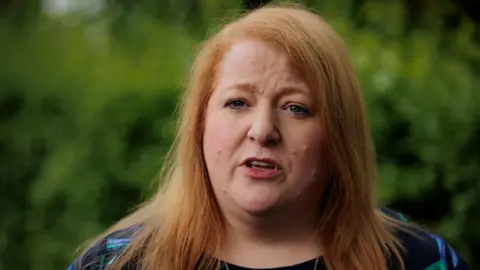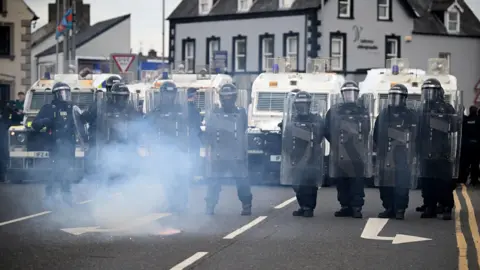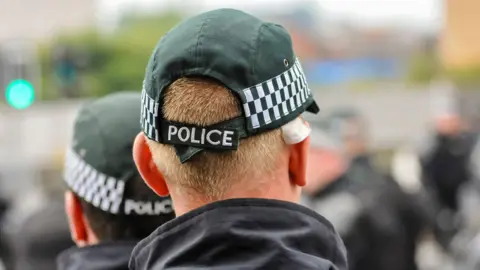Extra £200m could be 'gamechanger for PSNI' - Long
 PA Media
PA MediaThe expected allocation of an extra £200m for the Police Service of Northern Ireland could be a "gamechanger" for the organisation, the justice minister has said.
Naomi Long said it would "allow us to rebuild police numbers which is the most important thing we can do".
In January, the Police Service of Northern Ireland (PSNI) said it needed £200m over five years to recruit hundreds of new officers and bring its headcount to 7,000.
On Friday, First Minister Michelle O'Neill said the finance minister was "very happy to sign that off" but added his recommendation must be approved by the Executive.
The PSNI is seeking to increase its workforce from its current all-time low of about 6,200 officers to 7,000 officers.
£20m gap in PSNI budget
Speaking to the BBC's Sunday Politics programme, Long said she had been working on the business case for some time and agreed real progress had been made.
"I think this is potentially a gamechanger for us in terms of being able to rebuild."
Long pointed out the PSNI currently has a £20m gap in its budget because of pressures like overtime and said recruiting more officers could fix that issue.
"If you have a right-sized force you can actually reduce the amount of overtime individuals are working and make some savings there," she explained.
"So I think this a really good opportunity to put the PSNI on a sustainable footing."
The justice minister said the recruitment investment would improve public safety and also allow officers to "get their rest days" and "look after their health".
She added funding was necessary to stop officers leaving their jobs "because they are under such personal strain as a result of having to work extended hours".
 Charles McQuillan/Getty Images
Charles McQuillan/Getty ImagesRioting pressures for police
The recent rioting in Northern Ireland exposed the pressure the PSNI is facing with its current workforce numbers.
Officers responded to several consecutive nights of violent disorder which began two weeks ago in Ballymena, County Antrim, and spread to other towns and cities.
The violence started on Monday 9 June, hours after two teenage boys appeared in court accused of sexually assaulting a teenage girl in Ballymena.
The two 14-year-old boys spoke through an interpreter in Romanian to confirm their names and ages and their solicitor said they would be denying the charges.
A peaceful protest was held in Ballymena later that day, but after that demonstration dispersed, rioting broke out.
Over the course of the next few days, 64 officers were injured while policing disorder in Ballymena, Larne, Portadown, Belfast and Londonderry.
The PSNI sought support from Police Scotland, which deployed officers to Northern Ireland under what is known as mutual aid arrangements.
Long also requested and received an additional £5m from the Northern Ireland Executive to meet the costs of policing the riots.
 Getty Images/Stephen Barnes
Getty Images/Stephen BarnesRiots a 'drain on resources'
Long said the riots were a "drain on the resources of PSNI".
"I put in a bid very early during the riots in Ballymena for additional resources for PSNI because we knew that they may need to call on mutual aid.
"That's £5m to police those riots and most of that £5m, if not all of it, will have already been spent."
The minister explained the PSNI needs £7m to cover its first year of recruitment under its business case and the rioting bill would have been better spent on that.
"It's hugely frustrating at a time when our justice system is so stretched that we have people not just putting pressure on the resources of the PSNI, but destroying their own communities at a cost to everyone in our society because that will all have to be repaired and rebuilt."
Last month, the Police Federation said that the PSNI had been told Stormont could not find the money for a £200m plan to increase officer numbers.
The Chief Constable, Jon Boutcher, said the "consequences of not getting the PSNI back on its feet will be dire".
At that time, Long criticised the Police Federation remarks as "inaccurate and extremely unhelpful".
